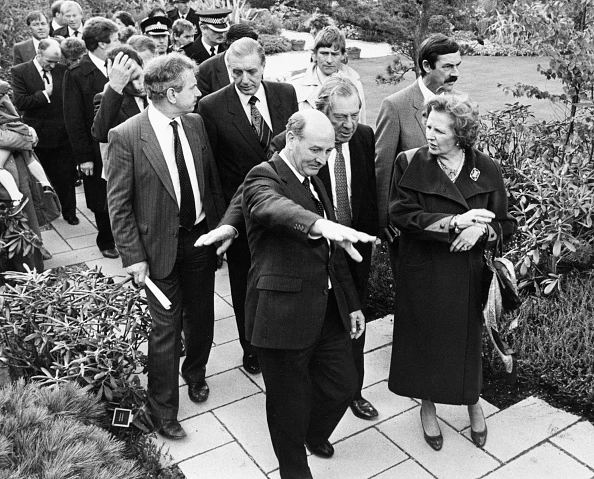
Patrick Jenkin‘s Liverpool trip came at a time of stand-off between the government and the hard-left Labour council, which was refusing to enforce the cuts the former was demanding of an already struggling city.

Jenkin was taken on a tour of some of the city’s worst slums; councillors had asked the disgruntled residents ahead of time to be polite. The plan worked. Jenkin emerged from the rat-infested terraces and declared: “I have seen houses here the likes of which I have never seen before.”
As far as political epiphanies go, Jenkin’s Liverpool enlightenment left Iain Duncan Smith’s Easterhouse epiphany in the dust. Backroom channels opened between the council and the Cabinet. That summer, a deal was hammered out, with the help of a lot of creative accounting.
And so, Liverpool’s brinkmanship seemed to have paid off. Despite the discomfort of central leadership, other Labour-held cities were so impressed that they began to plan their own act of defiance against Thatcher’s plan to make them cut spending. Those involved included future household names, including David Blunkett (Sheffield) and John McDonnell (Lambeth).
The idea behind what became known as the 1985 “rate-capping rebellion” was simple: no council would set a rate – the forerunner to council tax – for the following year. This allowed councils to avoid the politically toxic decision of raising taxes or cutting spending while in turn forcing the Westminster government to give up its plan of outsourcing austerity, or directly intervene. As the biggest rebel of the lot, Liverpool felt obliged to join in, although even at the time many councillors – including those on the left – feared that it would end in disaster.
And that was pretty much what happened in Liverpool
One by one, the councils caved in. Some leaders were overruled after Labour councillors defected to the opposition. Others were sufficiently scared by the threat of legal action to find a fudge. Meanwhile, the Labour leadership made its opposition clear and, with the Miners’ Strike over, Thatcher was ready for her next battle.
Finally, just Liverpool and Lambeth were left. In June, Liverpool set a rate – although such a ridiculously low one it effectively meant an illegal budget. Support for this gesture was remarkably wide. According to the writer Michael Parkinson, one defiant backbench councillor said at the time: “I’m not a Marxist, I don’t even believe in all this political stuff. I just don’t think it’s fair.” In Lambeth, a legal budget was eventually passed in July 1985, but not before one councillor put another in a headlock.
Despite these final acts of defiance, the rate-capping rebellion ended in failure. The Lambeth and Liverpool councillors were expelled and pursued through the courts. Thatcher sacked Jenkin, the minister who’d been so moved by what he saw in Liverpool and passed new laws setting deadlines for council budgets. Councils have never again launched such an audacious attempt to force the government’s hand.
This is despite a decade of Tory-led governments imposing crippling austerity. “Today we are seeing even deeper cuts to local authority funding,” wrote Blunkett, by then a retired New Labour minister, in 2011. But, unlike the 1980s, he added, “The revolutionary fervour, sadly, does not exist”. In fact, an anti-austerity movement would emerge, only to focus its energy on Jeremy Corbyn in Westminster.
This plan, too, failed. But whatever ideological rearrangement happens in the national Labour party, the fact remains that local government has absorbed billions of cuts. Libraries are closing, and social care is in crisis. If councils end up leading another rebellion, it won’t be out of fervour, but necessity.
[Read more: The leaving of Liverpool shows up Unesco’s flaws]






